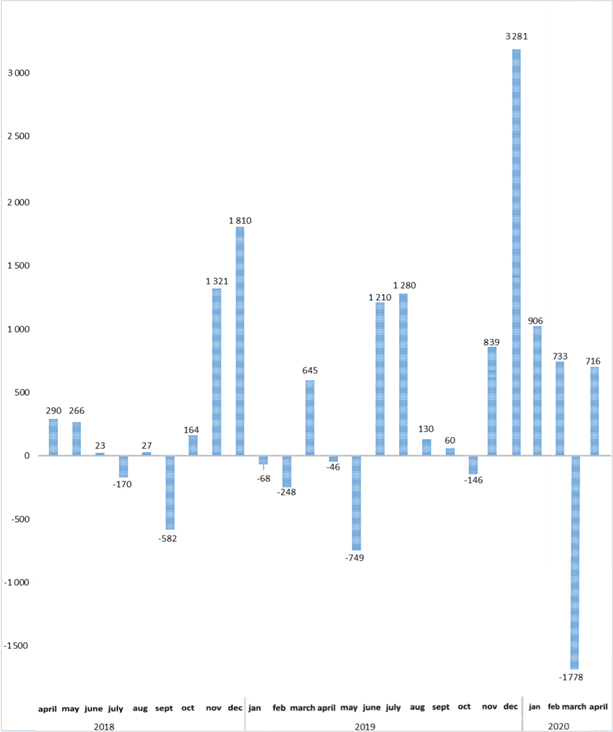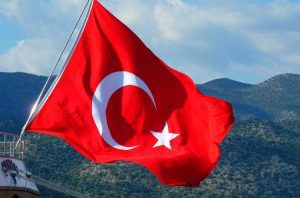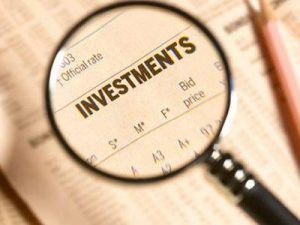
The Business Activity Outlook Index (BAOI) calculated by the National Bank of Ukraine (NBU) grew by 9.6 points in June, to 45.5 points, which is lower than the neutral index reading of about 50 and means that pessimistic expectations of business prevail, the regulator said on its website on Wednesday.
“Ukrainian business is gradually recovering from the blow that the coronavirus crisis inflicted on it. The NBU poll indicates that the mood of entrepreneurs in June improved. Economic activity gradually recovered, both in Ukraine and abroad, after quarantine restrictions were eased,” the NBU said.
According to the regulator, the new wave of quarantine easing contributed to economic activity of retail companies – the diffuse index (DI) grew to 50.5 points from 37.6 in May.
The service sector also showed better expectations: DI grew by 12.3 percentage points, to 40.8.
Expectations of industrial enterprises, which DI grew from 40.4 to 49.2, also improved.
Construction enterprise expect the worsening of its activities: DI in June fell by 4.1 pp, to 36 points.
Employment assessments of all sectors retain pessimistic.
Dynamics of balance of payments of Ukraine (USD MLN)

The Hungarian low cost airline Wizz Air has opened the second base in Ukraine at Lviv International Airport.
According to the press service of the Infrastructure Ministry of Ukraine, in July the company will operate five new flights from western Ukraine, in particular, from Lviv to Billund (Denmark), Tallinn (Estonia), Lisbon (Portugal), Hamburg (Germany), and Szczecin (Poland).
Wizz Air also plans to expand its route network by opening flights from Kharkiv to Tallinn and Berlin.
“The Ukrainian aviation industry needs to be restored as soon as possible for a further stable functioning and growth. Therefore, it is very pleasant that both Ukrainian and leading international airlines do not lose optimism during the coronavirus crisis, but rather seek new opportunities for development, opening up new popular directions. Wizz Air is a leading low cost company, which was one of the first to enter the Ukrainian market back in 2008,” Minister of Infrastructure Vladyslav Krykliy said.
It is expected that the opening of a new Wizz Air base will bring Lviv more than $100 million investment in 2020 and create more than 30 jobs.
“We are convinced that investments in opening the base and new routes will stimulate the development of the local economy, aviation and tourism,” Andras Sebok, the chief supply chain officer at Wizz Air, said.
The director general of Lviv Airport, Tetiana Romanovska, in turn, noted that 17 directions to different cities of Europe have already been opened from the airport.

Foreign Minister of Ukraine Dmytro Kuleba will pay a visit to Turkey on July 3-4 to participate in the 8th meeting of the Ukrainian-Turkish Joint Strategic Planning Group along with his Turkish counterpart Mevlut Cavusoglu. During the meeting, the parties will sum up the results of cooperation in the first half of 2020 and set priority tasks until the end of the year.
According to the press service of the Foreign Ministry of Ukraine, the ministers will also discuss a wide range of issues related to mutual cooperation and regional security.
“Special attention will be focused on the militarization of Crimea, violation of human rights on the peninsula by the Russia-occupation authorities, the situation with security in the Azov and Black Sea region and in the Middle East, resistance to Russia’s aggression in Donbas and initiatives aimed at peaceful settlement of the conflict in eastern Ukraine,” the ministry said.
The ministers will also discuss the development of trade and investment between Ukraine and Turkey, deepening of cooperation in the spheres of energy, security and defense, the prospects of the completion of the negotiation process on the Free Trade Agreement, cooperation within the UN, NATO, OSCE and the Council of Europe. The officials will also discuss the preparations for the 9th meeting of the High Level Strategic Council chaired by the presidents of Ukraine and Turkey.
The ministers will give a joint press conference on the results of the meeting.
Kuleba will also hold a separate meeting between Ukrainian businesspeople and Turkish entrepreneurs, who are ready to invest in Ukraine.
He will also meet with representatives of the Ukrainian and Crimean Tatar communities in Turkey, the ministry said.

On July 2-3 the Eastern Partnership Youth Engagement Summit will be held.
Eastern Partnership Youth Engagement Summit will be the first large youth event in the European Union and Eastern Partnership countries in an online format.
Details at: https://www.salto-youth.net/mysalto/login/?pfad=%2Ftools%2Feuropean-training-calendar%2Fapplication-procedure%2F9470%2F

President of Ukraine Volodymyr Zelensky submitted to the Verkhovna Rada a bill of Ukraine on government support for investment projects with significant investments – the so-called law on “investment nannies,” Deputy Head of the Presidential Office Yulia Kovaliv has said.
“I want to debunk the myths and memes about the ‘nannies’ that have flooded the media space and emphasize that this bill is primarily about providing a number of stimulating instruments of government support for investment projects,” she wrote on her Facebook page on Wednesday.
In particular, according to her, the bill provides for: securing investor guarantees by concluding a direct agreement with the Government of Ukraine for 15 years, appointing an investment manager authorized to accompany the investor in the process of preparing and implementing the project; providing tax benefits – exemption from income tax, exemption from payment of duties and VAT when importing new equipment into Ukraine; facilitating the provision of land necessary for the implementation of the project; building/reconstructing related infrastructure at the expense of the state (roads, electric and gas, heating networks, water networks, utilities, etc.).
“I want to note that the total amount of government support will be up to 30% of the amount of investment in the project,” Kovaliv said.
She said that this bill will support Ukrainian and foreign investors, whose investment amount should be at least EUR 30 million. They should create at least 150 new jobs with an average salary of workers at least 15% higher than the average salary in the relevant field in the region. Projects must be implemented in five years, and the duration of the special investment agreement with the government of Ukraine is 15 years.